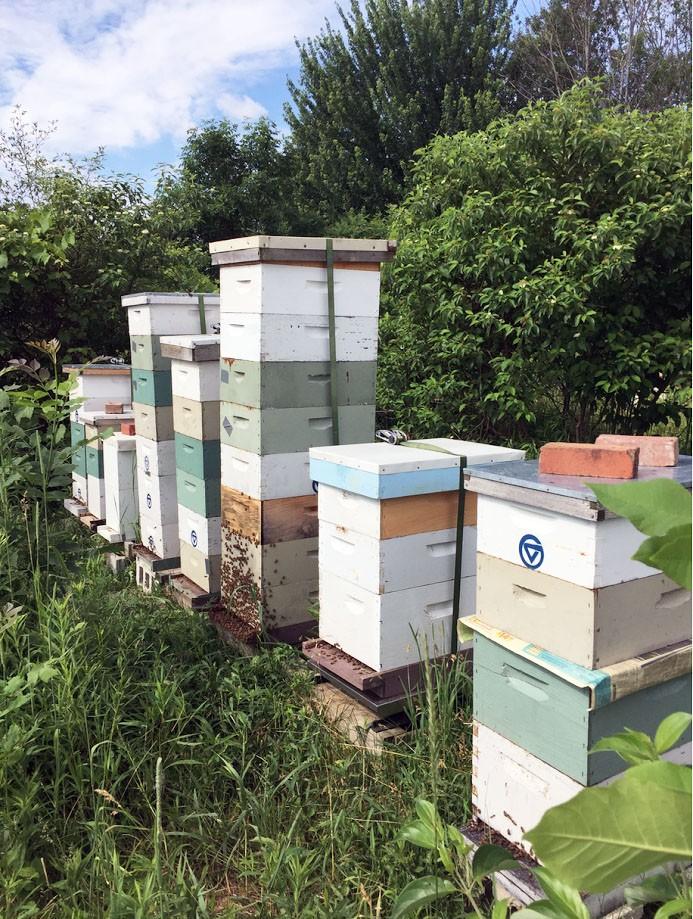GVSU environmental professor studies beekeeping in Slovenia

GVL / Courtesy – Anne Marie Fauvel There are A-Z hives in the back (Slovenia)
Oct 26, 2017
In September, Anne Marie Fauvel, adviser for the Grand Valley State University Beekeepers club and professor of environmental studies and liberal studies, traveled beyond the fields of Western Michigan to Slovenia, in central Europe, to further her professional development. It was there that she learned more about beekeeping and additional beekeeping management practices.
Fauvel took a leave of absence from GVSU for the fall 2017 semester so she could finish up various projects and research associated with honeybee populations in the West Michigan area, and her trip to Slovenia was an accessory to her studies. Fauvel’s focus on ecology and the impact humans have on nature relates to her research on honeybee populations as they are a critical aspect of the ecosystem.
“(Honeybees) are a true vehicle for interdisciplinary studies because they are a reflection of what happens in the environment,” Fauvel said. “When you start studying honeybees, you start making a lot of connections of how we treat the environment.”
Fauvel’s interest in honeybees goes beyond her research. Her fascination with honeybees began more than 10 years ago when she first visited a beehive.
“I opened the cover (of the hive), and there’s an entire world that functions in a way that we could learn a lot from,” she said. “It’s an interesting society, and it’s an interesting way of dividing up tasks. I fell in love, and then I became fascinated and had more questions that I could answer. I read, I went to meetings, I got involved.”
Fauvel currently sits on the board of the Muskegon Beekeepers Association and is the president of the Holland Area Beekeepers Association.
As the rapid decline of honeybees is a global issue, Fauvel looks to other areas in the world, such as Slovenia, for alternative and more sustainable approaches to beekeeping.
Fauvel said Slovenia is a relatively small country, comparable to the size of New Hampshire, enabling Slovenia’s food system to be localized. This contrasts with the heavily industrialized food industry of the U.S. Beekeeping in Slovenia reflects these factors, as bees are kept in smaller colonies. Commercial beekeepers in the U.S. may include more than 50,000 hives, while the largest commercial beekeeping Fauvel saw in Slovenia included 700 hives.
The conclusion that beekeeping in the U.S. would benefit from localized colonies was merely a confirmation for Fauvel.
“But it shows what can happen when you have a small community agriculture, rather than industrial,” she said.
With the semester more than halfway over, Fauvel is debating her next step. It will partially consist of finishing ongoing projects at GVSU. This includes continuing to gather data from a mobile application Fauvel collaboratively developed with Jonathan Engelsma, GVSU professor of computer and information science.
Fauvel credits Engelsma as a critical contributor to the research of local honeybees.
“He is my greatest contributor and collaborator,” Fauvel said via email. “Without him and his students, none of these projects would be happening.”
The mobile application permits users from all over Michigan to collect data on pollen and sort pollen and then look and the quantity and diversity of pollen.
Although this study is taking place within Michigan, Fauvel said it will contribute to national studies of bee populations.
“We feel good about the fact that we’ve contributed a useful tool to collect more data so that we can have more information about what is going on with our bee population,” Fauvel said.
Fauvel will also continue to advise students within the GVSU Beekeepers. She noted the various obstacles that come with leading the club: Like many clubs, members come and go. Therefore, the opportunity to gain knowledge and skills for beekeeping is limited for students.
“Beekeeping has a very steep learning curve,” Fauvel said. “It’s not something you can just jump in and have a bunch of students do.”
One student who has benefited from Fauvel’s guidance is Troy Jones, a biomedical sciences student and the vice president of the GVSU Beekeepers club. Jones said it was Fauvel who first piqued his interest in beekeeping after one club meeting.
“She’s been an excellent resource that I have, or anyone might have, about bees,” Jones said.
Fauvel considers her roles as an adviser, professor and researcher beyond the significance of contributing to science. Ultimately, Fauvel believes everyone, herself included, needs to look at the bigger picture.
“The education, the research, the gathering of info is a much bigger picture of how humans relate to nature,” she said. “My goal is to keep on understanding what’s going on with the honeybees with the greater goal of understanding what our role as human beings as the human race is in nature and this earth.”
Jones expressed his admiration for Fauvel’s “worldly” perspective.
“She brings in the mentality that everyone is important and someone is going to have a different perspective than you have,” he said.
Looking at the bigger picture does not strictly mean considering the importance of honeybees. Rather, Fauvel acknowledges that not everyone will impact nature by advocating for honeybees. Individuals have numerous mechanisms for contributing to the flourishing of nature, like studying bats or nutrition. Fauvel encourages others to pursue these interests and look at the bigger picture.

























